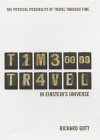
Time Travel In Einstein’s Universe
Time Travel In Einstein’s Universe J Richard Gott Weidenfeld London 2001 £18.99 302pp 029760760X
Merchandise Links
|
If I only put my hand in a time machine and pulled the switch, what would happen to my hand? Would I bleed? Would it still be there, but a parallel universe open up where my disembodied hand would exist á la Thing? Would there be a black hole in space and time where my hand used to be? Gott doesn’t answer this most troubling of questions.
Perplexing.
Nowhere is the connection between the apparent polarities of art and science stronger than between Science Fiction and Physics. In the literary genre, Physics achieves mythical proportions, in Physics, the genre finds both teacher and devotee. More than this, as Gott makes clear in the opening chapters of this book, Sci-fi is often the inspiration for many advances in physics. This is, generally, a finely crafted book, which details the understanding of time travel through the years from the perspective of a major physicist. Lucid, yet with a few stylistic ticks (which I’ll come to), this book will act as go-between for those of us who need an introduction to these complex theories.
Fascinating.
Gott denies the Jinn principle. This principle goes as follows: an old lady meets you and gives you a gold watch, remarking you were the love of her life; she tells you to go to a certain hotel and look at the guest-list for 1921; you look and find both her name and yours; you get in a time machine, travelling back to 1921, where you sign your name, meet the (now young) lady, fall in love and give her the gold watch as a gift, before you are forced to leave for the ‘future’ again. Who created the Jinn, the gold watch? Hmm. So the Jinn is a logical impossibility. However Gott’s own solution to the creation of the universe involves such a Jinn principle. He argues for a self-creating universe — one in which one branch universe doubles back on itself, like a “horn which plays itself”. Naughty. The birth of the universe = genie time travel.
Intriguing.
More than this, despite what John Gribbin says in his The Birth of Time, there is a sense of the ridiculous in theorising the age of the universe. In all honesty, physicists can never convince me that the universe is around 11.5 billion years old, no matter how many great minds they involve in the discussion. Gott, who discusses this, does little to counter my distrust, indeed his examples of how theoretical physics has been proved right by practical developments are shaky. Splitting the atom, one of his examples, took place on earth, according to our physical laws. How do we know all the universe acts according to these laws? Furthermore, because this and other theories have been proved right, does not mean time travel is really possible, does it? As this is Time Travel in Einstein’s Universe, surely it is as theoretical as Physics in Newton’s Universe? Perhaps I have got the wrong end of the stick, Physicists (unlike politicians) never claim to have the whole truth, yet Gott has an intriguing way of complicating issues through attempted elucidation.
Mind-bending.
I would rather the sums be printed clearly, being explained simply and eloquently, than be bombarded with slices of pizza and cut-out paper cones, with the absence of any real calculus. The perception that non-scientific readers need primary-level ‘visual aids’ is as ‘charitably’ patronising as our current education system — science made understandable, should not mean science-lite. However, the Notes in the back go some way to countering this problem, and the discussion of all the major theoretical modes of time travel is wonderfully handled. Gott’s love of the subject would make the most unscientific reader (me) enthuse about the possibilities.
Expanding.
Time travel theory is still in its childhood. Gott’s achievement ranks with that of John Gribbin (mentioned above), in making these scientific theories available to the general public. He avoids most of the pitfalls of scientists attempting coherent sentences, but falls into the trap of physics-dork jokes and a little too much pride in having his work mentioned alongside Spock in a Star-Trek novel, not the series mind, but a spin-off novel. Like many scientists, his morals are non-existent: the atomic bomb, in his words, was ‘dramatic’ proof of theoretical calculations. So, to his verbal ticks: ending paragraphs and sentences with an exclamation or interjection is annoying to say the least; he acknowledges his debt to his wife’s editing, so he may not wholly be to blame. Despite this, I was never bored, and it is to Gott’s credit that I have come closer to understanding the brilliance and lunacy of current scientific thinking in this area of Physics. A book to read and enjoy; Gott is not quite Stephen ‘my eyesight means a lot to me’ Hawking, but he comes pretty close.
Reviewed by Gregor Milne
